Holmens Kanal
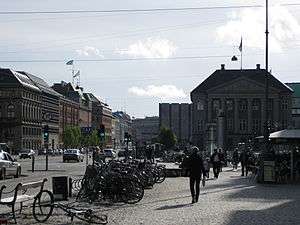
Holmens Kanal is a short street in central Copenhagen. Part of the main thoroughfare of the city centre, it extends from Kongens Nytorv for one block to a junction with a statue of Niels Juel where it turns right towards Holmens Bro while the through traffic continues straight along Niels Juels Gade. The street was originally a canal, hence the name, but was filled in the 1860s. Today it is dominated by bank and government buildings.
History
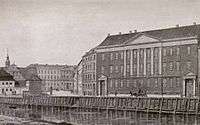
The canal
As part of his upgrade of the fortifications of Copenhagen, King Christian IV extended the city's East Rampart, taking it straight through Bremerholm, the royal naval shipyard, to the beach. The moat in front of the rampart was dug in 1606 and became known as Holmens Kanal after it was expanded to serve as a new harbour for the Royal Fleet after its ships had become too large to enter the Arsenal Harbour further south.
Conversion into a street
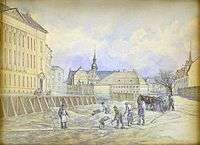
The canal lost its practical use after the naval fleet relocated to Nyholm, a newly reclaimed area north of Christianshavn on the other side of the harbour. Holmens Kanal deteriorated into an open sewer fed by the city's extensive system of gutters and a notorious nesting ground for rats which were a menace to the adjacent Royal Theatre and other prominent buildings in the area.[1]
The severe cholera outbreak which hit Copenhagen in the summer of 1953 (typo: this date should read 1853) made it clear that the canal posed a hazard to the health of the population. When the Navy decommissioned their last operations in the area in 1859, it was decided to fill the canal in connection with the redevelopment of the Gammelholm neighbourhood, converting it into a street.[2]
The street
The new street was inaugurated in 1864. It was the first street in Copenhagen to be installed with pavements and individually numbered houses.[1]
A new building for the National Bank of Denmark designed by Johan Daniel Herholdt was built in the street between 1865 and 1870.[3]
Cultural references
Egon Ove Sprogøe steals a suitcase with money from a bank in Holmens Kanal by replacing it with another suitcase at0:56:18 in the 1972 Olsen-banden film The Olsen Gang's Big Score.[4]
Buildings
- No. 2: Erichsen Mansion
- No 7: Grøns Varehus
- No. 22: Church of Holmen
 Danske Bank headquarters seen along Holmens Kanal with Arhe Jacobsen's National Bank in the background
Danske Bank headquarters seen along Holmens Kanal with Arhe Jacobsen's National Bank in the background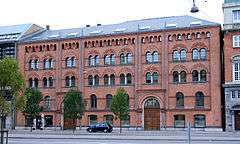 Grøns Varehus
Grøns Varehus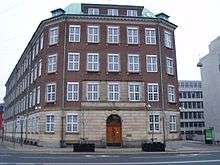 Ministry of Defence
Ministry of Defence
Niels Juel statue
.jpg)
The large statue of Niels Juel was installed in 1881 to commemorate his achievements in the Battle of Køge Bay in 1677. It was designed by the sculptor Theobald Stein and cast in bronze. In 2002 the City Council decided to move the statue to a new site on the waterfront to make way for a more efficient distribution of the traffic at its busy junction. This decision was met with severe criticism, including protests from the Royal Naval Museum, and in 2003 the Danish Heritage Agency decided to stop the move.[5]
See also
References
- 1 2 "Da Holmens Kanal var kloak" (in Danish). Berlingske. Retrieved 2011-10-21.
- ↑ "Gammelholm" (in Danish). Gyldendal. Retrieved 2009-11-25.
- ↑ "Holmens Kanal" (in Danish). indenforvoldene.dk. Retrieved 2011-10-06.
- ↑ "Film 4 Olsen Bandens store kup / Die Olsenbande und ihr grosser Coup". olsenbande-homepage.de (in German). Retrieved 1 October 2017.
- ↑ "Søhelten Niels Juel bliver stående på sin plads" (in Danish). Politiken. Retrieved 2011-10-21.
External links
| Wikimedia Commons has media related to Holmens Kanal. |